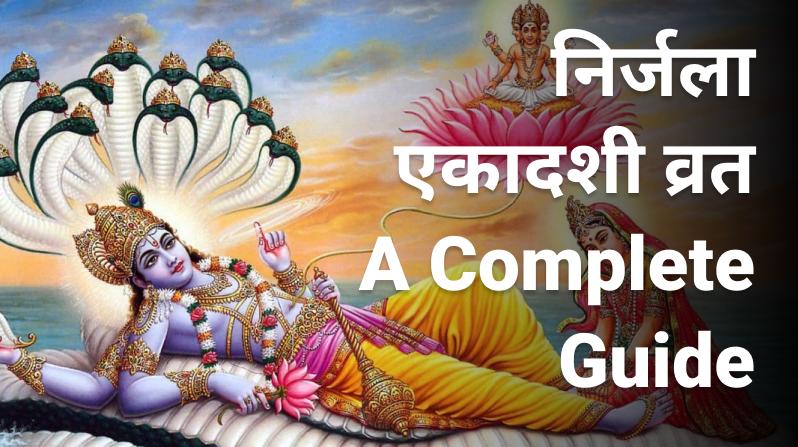
Nirjala Ekadashi is one of the most significant and revered fasts in Hinduism. It is observed on the Ekadashi (11th lunar day) of the Shukla Paksha (waxing moon phase) in the Hindu month of Jyeshtha (May–June). The term “Nirjala” means “without water,” making this fast the most austere among all Ekadashi fasts.
2. Significance of Nirjala Ekadashi
This fast holds immense spiritual importance. It is believed that observing Nirjala Ekadashi grants the merits of all 24 Ekadashi fasts observed throughout the year. It is a powerful act of devotion, discipline, and self-control, recommended especially for those who are unable to observe every Ekadashi.
3. When is Nirjala Ekadashi Observed?
Nirjala Ekadashi is observed on the 11th day of the waxing moon in the month of Jyeshtha. In 2025, Nirjala Ekadashi will fall on June 9th. The exact date may vary based on local lunar calendars.
4. Mythological Background (Vrat Katha)
According to the Mahabharata, Bhima, one of the Pandava brothers, found it difficult to observe the Ekadashi fasts due to his great appetite. Sage Vyasa advised him to observe just one fast—Nirjala Ekadashi—with complete devotion and abstinence from food and water. By doing so, Bhima could gain the merits of all Ekadashis. Since then, this day is also known as “Bhimseni Ekadashi.”
5. How to Observe the Vrat
Pre-Fast Preparation: Eat a light, sattvic meal on the evening before the fast.
On the Day of Fast:
Wake up early before sunrise.
Bathe and wear clean clothes.
Offer prayers to Lord Vishnu with tulsi leaves, flowers, incense, and lamps.
Read or listen to the Nirjala Ekadashi Vrat Katha.
Chant Vishnu Sahasranama or perform kirtan.
Completely abstain from food and water for 24 hours.
Breaking the Fast: On the next day (Dwadashi), feed Brahmins or the needy, then break your fast with a simple meal.
6. Rules and Precautions
Maintain mental and physical purity.
Avoid anger, lies, and negative thoughts.
Refrain from watching or engaging in entertainment.
If fasting without water is not medically feasible, consult a doctor.
7. Scientific Perspective
Fasting gives the digestive system a break and allows the body to detox. A dry fast (without water) may stimulate mental clarity and discipline, but it should only be done by those in good health. Nirjala Ekadashi is a blend of spiritual devotion and bodily discipline.
8. Spiritual and Religious Aspects
On this day, devotees focus on:
Chanting Lord Vishnu’s name.
Reading the Bhagavad Gita and Vishnu-related scriptures.
Participating in temple rituals, bhajans, and community prayers.
Practicing charity and acts of kindness.
9. Benefits of Observing Nirjala Ekadashi
Equivalent to observing all Ekadashi fasts of the year.
Forgiveness of past sins and spiritual purification.
Enhancement of willpower and discipline.
Peace of mind, emotional stability, and divine blessings.
Promotes compassion, humility, and detachment from material desires.
10. Regional Variations
North India: Pilgrims take holy dips in rivers like Ganga and Yamuna.
South India: Devotees perform bhajans and recite scriptures.
Western India: Community prayers, storytelling sessions, and temple processions.
Eastern India: Observed with kirtans and public feasts after the fast.
11. Environmental Message and Awareness
The abstention from food and water symbolizes the importance of conserving natural resources. Nirjala Ekadashi can be seen as a spiritual reminder of the significance of water, urging communities to reflect on environmental stewardship.
12. Nirjala Ekadashi in Modern Times
In today’s fast-paced world, this vrat is a moment of pause and introspection. It is gaining popularity among youth and urban dwellers who seek a connection with their spiritual roots. Online platforms now offer access to digital katha, live temple events, and group satsangs.
13. Frequently Asked Questions (FAQ)
Q1: Can anyone observe Nirjala Ekadashi? Yes, anyone can observe it, provided they are healthy enough to fast without water.
Q2: Is it compulsory to fast without water? Traditional observance includes no water, but those with health issues can modify the fast.
Q3: Can we sleep during Nirjala Ekadashi? It is best to remain awake or engaged in devotional activities, but resting is not prohibited.
Q4: What if I accidentally drink water during the fast? Continue the vrat with devotion. Intent matters more than perfection.
Q5: Are women allowed to observe this fast? Yes, women can observe Nirjala Ekadashi with full devotion.
14. Conclusion
Nirjala Ekadashi is more than a religious fast—it is a day of purification, devotion, and ecological mindfulness. By observing this vrat, devotees not only seek the blessings of Lord Vishnu but also strengthen their self-control, mental discipline, and commitment to a higher purpose.